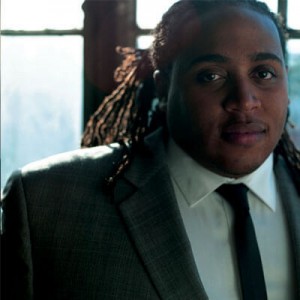As he gears up to release his debut album, Jamison, due out on June 23, drummer Jamison Ross is taking inventory of his remarkable career.
Ross talked to us about the album, the relationship between his singing and drumming, what he’s learned from collaborating with and supporting other musicians, his own composition methods, and what he loves about jazz.
Have you always been a singer?
Yeah, well I grew up singing in church, you know, all my life. My dad was a prolific pianist and singer, my mom was a singer, my uncle sings. Singing was something I never had formal training with, I was always told at a young age that I had a gift with singing. But in regards to formal training, I studied jazz drum set. Nobody really knew I could sing. Pockets of people knew, people who grew up with me and watched me develop as a musician, because that was, you know, a part of me.
So this album was a way to put that all out there?
At first I was going to play drums on the record—I got the deal with playing drums—and then I decided to just put an honest expression of myself out, and be completely vulnerable about it, and do what I hear in my head. So I ended up singing. Which is a large part of how I play the drums.
I’m always curious, since I’m not a musician, for me the vocals are always the most immediately accessible part of a jazz tune. But if you’re a multi-instrumentalist, are the things—the feelings and ideas—you’re expressing through your voice the same ones that you’re trying to get across when you drum? Or do you take on kind of a different persona for each?
Whoooo. When I’m playing, for me, I like to say yes. They’re expressing the same persona. My voice and my melodic concept of music enhance my playing. I don’t hear rhythms; I hear melody, and motion, and harmony. Even though I play a rhythmic instrument, I like to let my voice lead that. Like, when I take solos, I like to create motific developments, create a melody, create a root tone. And I’d like for people to pay attention to what I’m doing with the drums just as if I were singing a song in front of somebody.
Did you play with the other guys on the album much before you started recording?
Oh yeah, we went to college together, man! These guys, they’re my brothers. We grew up, musically, together at Florida State University in Tallahassee. With the exception of Jon Batiste, the whole band. We’re from all over, and we all came to Tallahassee to study jazz. And it’s kind of crazy, because if you look at Tallahassee, it’s the south, it’s a big football school. But there was this phenomenal jazz program in the middle of a state school. We were in this degree that wasn’t common in our area, nor our age group, and that forms bonds. The way we hear the music together, the soulfulness that we hear. The way the music is supposed to flow. We really believe, we really care about that in the same way.
And what is that way? If you can even describe it in words.
Well… music has a stream. So it’s like, you see the Gulf Stream, and all the water’s going the same way. And of course, different spots have different colors to it. You know, you might have one spot that’s brighter, one spot can be a little darker, one spot can have more water than the other. But it all moves. It shifts and moves in the same direction. We like to consider ourselves as a pure stream of consciousness. And that’s why the recording process was one of the most special moments of my life.
You’ve played with all sorts of amazing musicians, but it must feel great to be following your own concept like this.
Man, you know, I enjoy collaborating with different people. Thus far in my career, with my supportive approach, I’ve made a living doing it, but it’s also something that I enjoy. Because I take it seriously. I’m like an open book. I like to find something beautiful in everything. Even if I don’t initially like it, my goal as a musician is to be open to whatever the process is. To be a part of it. Not just play it, but get inside it. To me, it’s hard to do as a young musician today, but we have to do more of that. We have to open ourselves up to other people, other things, not even just other music, man, but other art forms. Art. Photography. [Jazz vocalist] Carmen Lundy really taught me that. She’s been such a prize to me, to keep me open, to be a true artist. And I’m not there yet; I’m still learning. She’s special to me all around.
What’s your own composition method like?
My voice. For me, I sing my melodies. I sing my melodies immediately. The tune on the record called “Epiphany,” you can hear me at the beginning, I take a jump solo and I’m singing at the same time… Long story short, that tune is me searching, with this journey of my voice and my drums. No words, but using my voice to create the melody, you know? Basically, that tune is an audio picture of my development and how I came up with this record. And me evolving into using my actual voice into my jump riding… It’s all about the melody to me. Most drummers would say it’s about rhythm, but to me it’s about melody. I’m a singer at heart. And I like to sing through whatever I’m doing.
And did you write the other parts with your voice as well?
Well, I’d start with that melody, and a drum groove, and then I’d be naturally singing the melody to the trumpet player and then the sax player. And then we record it, and then we write it down. And that’s how it’s supposed to be, man. You know, we have so much technology in our hands these days, we have so much capability for what we can do with music and with computers. But man! The way they wrote the special tunes of our ears, those really special jazz tunes, even people like Stevie Wonder and Donny Hathaway, who are some of my big influences, and Lee Dorsey, they wrote in the moment. Whenever they were inspired to write, they put it out. That moment, you’re given that moment, and then once that moment is created, you try to lock it in. Keep it there, you know?
Definitely.
We may end up scrapping the whole entire first part of a song based on the energy being in one specific part of the song. And then we’ll go from there. You see what I’m saying? The energy, the tune—it has to feel right. If it doesn’t touch you, it’s not gonna touch anyone else.
Yeah, those are the performances that really grab me. Across genres. Like, that honesty, the fact that you can tell they’re putting something out there, and they mean it, and you can take it or leave it.
That’s jazz, man. We often find ourselves, especially the young generation, playing jazz as if it’s an absolute answer, you know? But it’s not. The people, the greats, that we’ve seen play for many years, they utilize the influences that were around them in their approach. Guys from the south write and play differently from, say, guys from Philadelphia. And that’s what I think is beautiful about this band. We embody the traditions of jazz but we don’t deny who we are as musicians, or as personal people. I’m gonna put myself out there and be happy with it.






